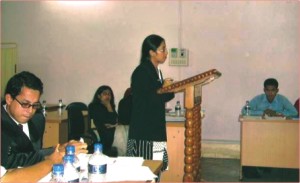|
Feature
Moot Court in Law Faculty
By Sharin Shajahan Naomi
 23rd September was the grand day on which the students of the Department of Law, University of Dhaka kept up with their constant triumph in the 2nd National Henry Dunant Memorial Moot Court Competition, 2006, organized jointly by the Faculty of Law and International Committee of the Red Cross (ICRC). Before talking about the victorious journey, let me tell you in brief what 'moot court' is. Moot court is the place where the law students argue on hypothetical cases before the Judges keeping in line with the court proceedings and manners. It is not like debate, where you can just tell - 'this incident is a grave violation of human rights' - without any supporting document. In moot court you cannot boldly state this argument without any supporting citations of different cases, authentic texts, applicable laws, and above all, your deduction. Not only that, after your formal submission, judges in the panel will trigger their ingenious bunch of questions like, 'Why do you think that the case you referred to, is relevant in this matter? Where from you are quoting your reference?' and it might conclude with 'we are not satisfied with this point of yours, please clarify it…' 23rd September was the grand day on which the students of the Department of Law, University of Dhaka kept up with their constant triumph in the 2nd National Henry Dunant Memorial Moot Court Competition, 2006, organized jointly by the Faculty of Law and International Committee of the Red Cross (ICRC). Before talking about the victorious journey, let me tell you in brief what 'moot court' is. Moot court is the place where the law students argue on hypothetical cases before the Judges keeping in line with the court proceedings and manners. It is not like debate, where you can just tell - 'this incident is a grave violation of human rights' - without any supporting document. In moot court you cannot boldly state this argument without any supporting citations of different cases, authentic texts, applicable laws, and above all, your deduction. Not only that, after your formal submission, judges in the panel will trigger their ingenious bunch of questions like, 'Why do you think that the case you referred to, is relevant in this matter? Where from you are quoting your reference?' and it might conclude with 'we are not satisfied with this point of yours, please clarify it…'
The Henry Dunant Moot is being conducted following the procedures of International Criminal Court (ICC) and charges are brought against the individual commanders under the Rome Statute. The court case regarding this moot was about a commander, MC, who has committed many nasty crimes during war. One of the two teams has to either prosecute the commanders or defend them.
Dhaka University, Chittagong University, Rajshahi University and Kushtia University were the teams taking part in the competition. Each teams consisted of two counsels (who pleaded before the judges) and one researcher. The eminent Judges who were selected from the different sectors such as academicians, serving and retired judges of the Supreme Court and the senior advocates of the Supreme Court. The noted judges decided the teams' cases and finally judged the best team.
After a pot full of legal arguments and replies to judge's scrutinizing queries, the final stage of the competition was decided between University of Dhaka and Rajshahi University. The thrilling competition came to an end, and University of Dhaka was judged the best would-be law-practitioners. Christabel Randalph, Taslima Yasmin and Azharul Islam Habib represented University of Dhaka the winning team. Mr.Nazmujjam Bhuiyan represented the coach for University of Dhaka. Sawkat from Rajshahi University got best 'Mooter' award for his individual presentation. In between the Moot competition, the audience indulged themselves in delicious meal. A dinner in Candle Light restaurant perfectly ended this well-deserved victory.
The motives of these 'moot courts' are not just to improve the skills of the Law Students. Its principal aim is to disseminate the teaching of International Humanitarian Law or the Laws of War. Triumph for the victorious DU team did not end in Candle Light only, the team qualified for the regional round to be held in Delhi at the end of this month where they will have to compete with other extraordinary teams from India, Nepal, Sri Lanka, Pakistan and Iran. All said and done, as a former participant of the 1st Henry Dunant National Moot Court Competition (the winning team of that year in Bangladesh and the winner of Best Memorial in the International Ones), I wish the team of Dhaka University all the best!
(Dept. of Law, DU)
Copyright
(R) thedailystar.net 2006
|
